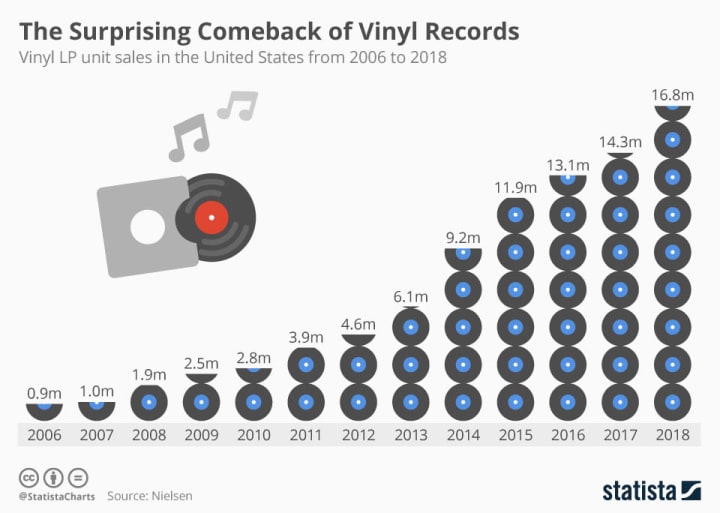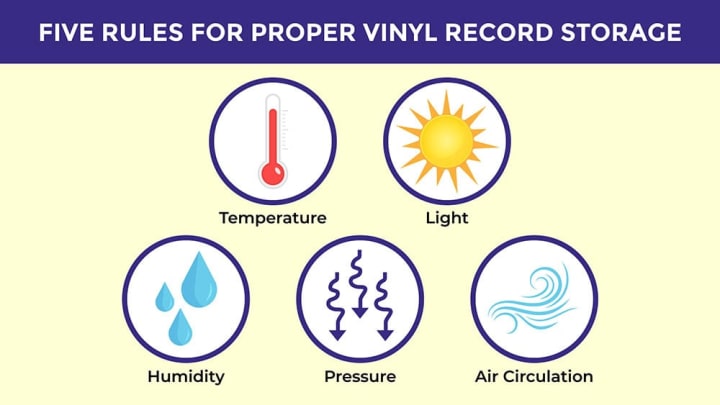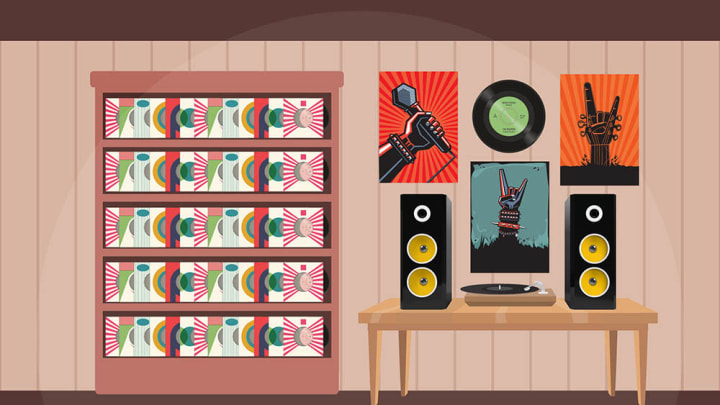Resurgence of Records: Vinyl Record Storage | Devon Self Storage

Let’s face it – a vinyl record renaissance is upon us.
Since 2007, the sale of vinyl records has steadily increased in the United States year-over-year, reaching monumental heights that far surpassed industry insights. According to Nielsen’s 2018 album consumption report, sales of vinyl LPs were up 15% from 2017, with record-breaking sales occurring during the week of the 11th annual Record Store Day. From April 20-26 of 2018, record store retailers sold a staggering 580,000 vinyl records – with the total sold for the year reaching upwards of 16.8 million.

Vinyl LP unit sales chart courtesy of Statista and Nielsen.
But just how is a century-old technology thriving in our increasingly digital world? And with modern advancements in music streaming technology – such as Spotify, Apple Music, and Youtube – how could a bulky, delicate, and outdated medium of music cause such ripple in the industry?
With the 12th annual Record Store Day happening this month, the Devon Self Storage team wants to take a deep dive into how vinyl records have officially re-staked their claim within the music industry, as well as discuss vinyl record storage practices – such as storing your record collection in a climate-controlled storage unit – that will ensure your valuable records are safe for years to come.
Vinyl Just Sounds Better, Man

One might think the resurgence of vinyl records is due to nostalgia, but most of the current demographic responsible for the surge (aka millennials) are far too young to have experienced records second-hand from their parents while growing up.
Surprisingly, vinyl’s newfound popularity is contributed to:
- The dematerialization of the music industry.
- Ritualistic, tangible experiences.
- The quality of sound that records produce.
- The buzz around events like Record Store Day.
The Dematerialization of Music
The digital landscape of music has left us with billions of MP3 (Moving Pictures Experts Group – Audio Layer 3) files floating around the internet. With access to so much music at our fingertips – via smartphones, computers, tablets, and MP3 devices – records provide a ritualistic escape from the dematerialization of music.
From sifting through LPs at your local record store for Record Store Day to the physicality of placing a record on a turntable, records provide listeners with an immersive experience that digital music can’t match. “It’s [vinyls] revival is about rediscovery of engagement, sensuality, coolness, care, ritual, rarity, and specific auditory experience,” write Dominik Bartmanski and Ian Woodward in their book Vinyl: The Analogue Record in the Digital Age.
The Perception of Playing a Record
According to Sean Olive (Director of Acoustic Research at Harman International) and Scott Metcalfe (Director of Recording Arts and Sciences at the Peabody Institute of Johns Hopkins University) in their interview with NPR, taking a record out, placing it on a turntable, clearing the dust, and setting the needle plays a huge role in how you hear the music. Both Olive and Metcalfe argue that perception has a lot to do with how listeners feel about a piece of music on vinyl versus its digital counterpart.
Fully Analog is Fully Lossless
The analog process of recording music allows the artist to transport their work from magnetic tape, to LP (Long Playing – an industry term that means “album”), to your speakers or headphones without the complications of digital conversion. Because MP3 files are compressed to be digitally stored and save space, they lose out on the complexity of musical information that physical records retain during their creation.
Vinyl Records Produce High Fidelity
Digitally engineered songs, or songs that are created solely to be streamed online or on the radio, are hyper-compressed and stripped of their dynamic sounds in a race for high-reaching volume. When a vinyl record is produced – whether through an entirely analog process or from a copy of a digital master – the quality of its sound is based upon the length of its sides and the depths of its grooves. This means that mastering a record for a specific genre of music will give it a higher dynamic sound range and provide the listener with musical information they would otherwise not get.
The “Warmth” of a Vinyl Record
When audiophiles use terms like full, airy, or warm to describe sounds records produce, they’re normally referencing subtle sound frequencies retained during the record-pressing process. “A full or warm sound comes from a system that reproduces low frequencies well. An airy sound means that the music reproduced gives the listener the impression that the instruments are in a spacious environment and usually refers to sounds in the high frequency range,” writes Jonathan Strickland, senior writer for the electronics and computer channels at HowStuffWorks. “Some audiophiles say that vinyl albums perform better in the lower frequencies, meaning they provide a warm sound.”
The Five Tenets of Vinyl Record Storage

With the resurrection of records in full swing, new audiophiles must learn that proper vinyl record storage is key to maintaining a well-playing, valuable collection for years to come – especially after you snag that rare gem you’ve been hunting for this Record Store Day!
According to Discogs (a user-built database and marketplace for all things vinyl records), there are five main aspects to vinyl record storage that ensures your music stays safe:
- Temperature Fluctuations – For most vinyl record storage, room temperature (59-77 degrees Fahrenheit) is fine for records to maintain their integrity. Attics are typically a poor place to store records, as temperatures can easily skyrocket and cause your prized possessions to warp. Oftentimes, basements can be a record hazard, as fluctuations from room temperature to colder temperatures can also damage your collection.
- UV Light Exposure – Records are sensitive to all types of light, especially exposure to direct sources of high-intensity UV rays. Storing them next to windows or in brightly-lit rooms can damage your collection in a matter of minutes. For proper vinyl record storage, make sure to keep your collection in places with little direct sunlight.
- Changes in Humidity – Much like heat, an overabundance of humidity can destroy an entire record collection rapidly. Keep vinyl record storage in drier spaces that maintain around 35-40 percent relative humidity. This prevents their flat shapes from distorting or warping.
- Pressure from Force – Records should never be stored flat – especially with heavy items sitting on top of them. Even the weight of one record stacked on top of another could cause warping. Store vinyl upright in storage containers made of wood (reducing static). Your containers should also feature sturdy dividers every 4-6 inches, supporting the entire face of the disc in its sleeve.
- Air Circulation – Proper vinyl record storage means that your collection must have adequate airflow. Avoid storing your records in sealed containers – such as plastic bins or taped up boxes – that cut off the air supply and create a microclimate that’s impossible to regulate. Opt for an open, wooden vinyl record stand that allows a temperature-regulated airflow to move through your records.
Vinyl Record Storage in a Climate-Controlled Self Storage Unit

At Devon Self Storage, our storage units can help any audiophile stow their prized collection in a climate-controlled environment. With a wide range of self storage unit sizes, available tenant insurance, and easy online payments, our storage units will protect your vinyl records from humid attics, dusty basements, and whatever else Mother Nature has in store.
If you find yourself with too many records after the 12th annual Record Store Day this year, don’t hesitate to reserve a storage unit at your local Devon Self Storage facility for proper vinyl record storage!